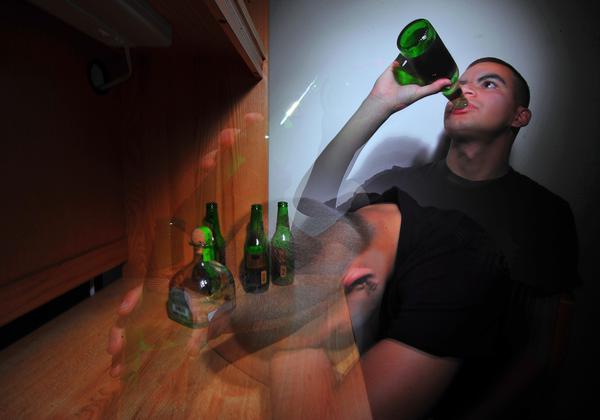Excess of anything is never healthy and the same applies in the case of alcohol. Alcohol experts have come to a conclusion that drinking too much alcohol reduces affects negatively in both the genders.
Alcohol Myth Busted
Since time immemorial, people have considered alcohol to be an aphrodisiac. However, this myth has been busted time and again by the side effects of excessive alcohol. On the contrary, alcohol is known to induce depression after consumption.
Alcohol, if consumed in unnatural quantity over a period of time can turn conditions like 'brewer's droop', which otherwise might be temporary into permanent impotence. Alcohol addiction is a cardinal sin for couples planning on having a baby. Women, whose bodies are much more sensitive and complex than a man's body, react greatly to even a small quantity of alcohol. Even government's guidelines on low-risk alcohol consumption unit do not guarantee no harm, and people are known to have taken much longer time to get pregnant and irregularity in their menstrual cycles even after abiding by the government's guidelines.
What Is Moderation?
No one is asking you to completely cut down on alcohol. But moderation should then be a religion for all the drinkers. Moderate drinking includes no more than 2 drinks per day (US. Centre for Disease Control and Prevention). The explanation is that your liver can act on alcohol at one standard size drink an hour, so heavy drinking means that too much alcohol for the liver to handle and hence unhealthy toxins are released in the body having an adverse effect on the sex life.
Some of the more common problems caused by alcohol in a couple's sex life are:
Long-term erectile dysfunction: The most common of all the problems, erectile dysfunction can most commonly be attributed to heavy drinking. 60% of men who are alcohol addicts are known to be suffering from loss of sexual appetite.
Ruined Families and relationships: Alcohol can be considered one of the biggest inducers of divorce among couples. It makes people less caring and more and more involved in their drinking antics. 90% of domestic violence incidents include alcohol.
Side effects of smoking: Drinking is usually accompanied by cigarettes and a cocktail of these two substances can be a deadly weapon against your sanity. For men below 40, erectile dysfunction primarily happens because of excessive smoking.
STDs: Alcohol consumption helps people shed their inhibition and cases of unprotected sex increases. It increases your chances of actually getting an STD. 50% of all impromptu sexual encounters happen in the presence of alcohol and 60% STD spread when alcohol is also in the picture. Young adults who consume alcohol at an alarming rate are 7 times more likely to indulge in unprotected sexual intercourse.
Hence, we see that alcohol addiction does not compliment healthy sex life and therefore people must toe in line at the right time to ensure the wellbeing of their lifestyle and sexual activities.
Do you worry about your friend or relative’s drinking habits? You are not alone. There are people who struggle for years with the same question - How can I tell if the person I love is an alcoholic or not?
Well, the good news is that you don’t need to be a medical professional to figure out the right answer to this vital question. Read on to find simple ways to know whether your loved one suffers from alcohol addiction.
First up is a short quiz about drinking habits, developed by Dr. John Ewing to identify alcohol addiction. Treat this as a pointer and take your loved one to an expert, if it points towards alcohol addiction. You can ask these questions directly to your loved one, or you can answer these questions on their behalf.
According to the developers, one "yes" to the four quiz questions signals a problem, and more than one “yes” means that it's time for you or your loved one to get professional help.
Have you ever felt you should cut down on your drinking?
Have people annoyed you by criticizing your drinking?
Have you ever felt bad or guilty about your drinking?
Have you ever had a drink first thing in the morning to steady your nerves or to get rid of a hangover?”
There are many signs of a serious drinking problem. These include certain behaviours such as:
Drinking just for getting drunk
Drinking alone
Keeping alcohol consumption a secret
Drinking to escape problems
Hiding alcohol bottles
Experiencing withdrawal symptoms like getting irritated or experiencing nervousness, nausea, getting shakes, breaking out into a cold sweat, and getting hallucinations when unable to source alcohol
Having problems at work, school, or home, as a result of alcohol consumption
Losing interest in activities you or your friend used to enjoy
Having blackouts due to heavy drinking
Anger and extreme irritation
Other extreme behaviors to watch out for are:
Being able to drink an awful lot of alcohol
Trouble stopping once your loved one starts drinking
A powerful urge to drink
There is another scientific way to determine, if your loved one is an alcoholic. In the US, medical professionals commonly use a criteria, listed in the fourth edition of the ‘Diagnostic and Statistical Manual of Mental Disorders’. According to it, the signs and symptoms of alcoholism are clearly laid down and it states that alcohol dependent people:
Will drink more to get their desired effect from alcohol
Experience withdrawal symptoms when the effect of alcohol wears off
Drink larger amounts of alcohol over a longer period of time
Will be unable to consistently control their drinking
Will leave important work for drinking
Will spend a lot of time during the day getting alcohol, drinking it, and recovering from hangovers.
Continue to use alcohol, despite knowing that their chronic physical or psychological problem is caused due to alcohol.
To be declared alcohol-dependent, your loved one must experience at least three of these criteria during a year.
However, there is still no one definite test to diagnose alcohol-use disorders. Therefore, professionals diagnose them by making use of the patient’s comprehensive medical, family, and mental-health information.
Scientists have identified a hormone that acts on the brain to stimulate thirst in response to sugar and alcohol, thereby preventing dehydration.
In the study, published in the journal Cell Metabolism, they found that the liver hormone or fibroblast growth factor 21 (FGF21) acts via the brain's reward pathway in mice to suppress the desire for sugar and alcohol in favour of drinking water.
"We knew that exposure to alcohol or sugar turns on production of FGF21 in the liver. What we now show is that this hormone then travels in the blood to a specific part of the brain, the hypothalamus, to stimulate thirst, thereby preventing dehydration," said Steven Kliewer from University of Texas Southwestern Medical Center in the US.
"Unexpectedly, FGF21 works through a new pathway that is independent of the classical renin-angiotensin-aldosterone thirst pathway in the kidneys," Kliewer said.
In mice, the hormone regulated hydration (water drinking) in response to nutrient stress.
The researchers found that normal mice and mice genetically unable to produce FGF21 drank similar amounts of water when given the typical chow diet.
However, a high-fat/low-carbohydrate ketogenic diet stimulated water drinking in normal mice while mice genetically unable to produce FGF21 failed to increase water intake in response to that nutritional stress.
Those findings confirmed the hormone's role in the signalling pathway, the researchers said.
A second important finding in this study is the very strong response to the hormone in humans.
For the study, 21 people were randomly assigned to drink either a mixture of alcohol and juice, or juice alone.
After four hours, the researchers measured their FGF21 blood levels. In response to alcohol, FGF21 levels peaked at around two hours and fell after that.
"This suggests that FGF21 might someday be used as a drug to limit alcohol consumption and protect against its effects in people," said David Mangelsdorf from University of Texas Southwestern Medical Center.
"Those findings also suggest that FGF21 is regulated the same way in humans as in mice and that the process involves the expression and activation of certain proteins in the brain," Mangelsdorf said.

Individuals exposed to nicotine during their adolescence are likely to drink more alcohol than those who were not exposed to nicotine or were only exposed to it during adulthood, finds a study over rats. The study showed that exposure to nicotine at a young age changes the neuronal circuitry in the brain’s reward pathways.
“This work on adolescent rats is particularly important because in recent years nicotine vaping with electronic cigarettes has increased among high school and middle school students,” said John Dani, from the Perelman School of Medicine at the University of Pennsylvania in the US.
In the study, reported in the journal Cell Reports, the team administered nicotine via daily injections to the animals during adolescence or adulthood, then measured alcohol self-administration after a delay, enabling the adolescent rats to reach adulthood.
The rats exposed to adolescent nicotine pushed a lever to obtain a slightly sweetened alcohol drink more often for a greater daily intake of ethanol compared to rats that did not experience nicotine or rats or that only experienced nicotine during adulthood.











